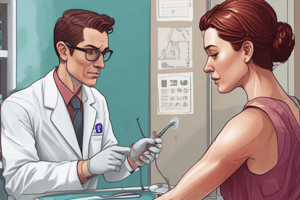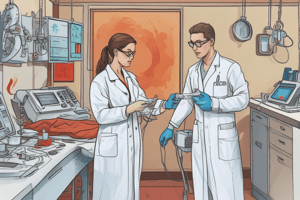Podcast
Questions and Answers
What is contained in a light green stoppered evacuated blood collection tube?
What is contained in a light green stoppered evacuated blood collection tube?
- Sodium fluoride and potassium oxalate
- Lithium heparin and a thixotropic gel (correct)
- No additives
- Ethylenediaminetetraacetic acid
Which tube should be handed when requesting a plasma separator tube (PST)?
Which tube should be handed when requesting a plasma separator tube (PST)?
- Gold
- Light green (correct)
- Royal blue
- Green
What percentage of isopropyl alcohol is typically found in alcohol pads?
What percentage of isopropyl alcohol is typically found in alcohol pads?
- 50%
- 65%
- 60%
- 70% (correct)
For a STAT prothrombin time test, which color tube is appropriate?
For a STAT prothrombin time test, which color tube is appropriate?
In the order of draw for a routine venipuncture, which tube would be collected fifth if all types are needed?
In the order of draw for a routine venipuncture, which tube would be collected fifth if all types are needed?
Which evacuated blood collection tube is used for tests requiring a clot activator?
Which evacuated blood collection tube is used for tests requiring a clot activator?
What is the primary purpose of sodium fluoride in a gray-stoppered evacuated tube?
What is the primary purpose of sodium fluoride in a gray-stoppered evacuated tube?
For a platelet function test, what additive should be avoided in the blood collection tube?
For a platelet function test, what additive should be avoided in the blood collection tube?
Which component is present in a lavender-stoppered evacuated tube to act as an anticoagulant?
Which component is present in a lavender-stoppered evacuated tube to act as an anticoagulant?
What is the main difference between sodium heparin and potassium oxalate as anticoagulants in blood collection tubes?
What is the main difference between sodium heparin and potassium oxalate as anticoagulants in blood collection tubes?
Which type of gloves is considered most appropriate for performing phlebotomy procedures?
Which type of gloves is considered most appropriate for performing phlebotomy procedures?
In which layer does the thixotropic separator gel settle when blood is centrifuged?
In which layer does the thixotropic separator gel settle when blood is centrifuged?
What is the primary mechanism through which Ethylenediaminetetraacetic acid (EDTA) prevents blood coagulation?
What is the primary mechanism through which Ethylenediaminetetraacetic acid (EDTA) prevents blood coagulation?
Which field primarily utilizes Ethylenediaminetetraacetic acid (EDTA) for blood tests?
Which field primarily utilizes Ethylenediaminetetraacetic acid (EDTA) for blood tests?
What physiological process is defined by the cessation of blood flow at an injury site?
What physiological process is defined by the cessation of blood flow at an injury site?
What is the primary role of thrombocytes in the circulatory system?
What is the primary role of thrombocytes in the circulatory system?
What distinguishes a thrombus from a normal clot?
What distinguishes a thrombus from a normal clot?
What is the primary function of valves in veins?
What is the primary function of valves in veins?
Which of the following statements about capillaries is true?
Which of the following statements about capillaries is true?
Which vein is most commonly chosen for blood draw by phlebotomists?
Which vein is most commonly chosen for blood draw by phlebotomists?
Which valve prevents backflow from the right ventricle to the right atrium during contraction?
Which valve prevents backflow from the right ventricle to the right atrium during contraction?
What is the primary function of red blood cells in the circulatory system?
What is the primary function of red blood cells in the circulatory system?
Which layer of the heart is responsible for the contractile function?
Which layer of the heart is responsible for the contractile function?
During hemostasis, what role do thrombocytes play in response to vascular injury?
During hemostasis, what role do thrombocytes play in response to vascular injury?
Which type of white blood cell is primarily involved in the removal of old red blood cells?
Which type of white blood cell is primarily involved in the removal of old red blood cells?
Which condition is characterized by periodic premature beats originating from the atria?
Which condition is characterized by periodic premature beats originating from the atria?
Which of the following heart rhythms is defined by a consistently slow heart rate, typically less than 60 beats per minute?
Which of the following heart rhythms is defined by a consistently slow heart rate, typically less than 60 beats per minute?
What is a key distinguishing feature of Atrial Fibrillation?
What is a key distinguishing feature of Atrial Fibrillation?
Which arrhythmia typically presents with 'sawtooth' patterns between the QRS complexes on an ECG?
Which arrhythmia typically presents with 'sawtooth' patterns between the QRS complexes on an ECG?
In which of the following conditions is the ventricular rate typically irregular?
In which of the following conditions is the ventricular rate typically irregular?
Which component of the blood is primarily responsible for oxygen transport?
Which component of the blood is primarily responsible for oxygen transport?
What is the main reason venous blood appears darker than arterial blood?
What is the main reason venous blood appears darker than arterial blood?
Which statement best describes the role of platelets in the body?
Which statement best describes the role of platelets in the body?
In which part of the heart does oxygenated blood enter after being returned from the lungs?
In which part of the heart does oxygenated blood enter after being returned from the lungs?
During pulmonary circulation, what is primarily added to the blood?
During pulmonary circulation, what is primarily added to the blood?
Which site is most appropriate for venipuncture when an IV is present in the patient's right hand?
Which site is most appropriate for venipuncture when an IV is present in the patient's right hand?
What vessel carries deoxygenated blood from the body back to the heart?
What vessel carries deoxygenated blood from the body back to the heart?
Which chamber of the heart is responsible for receiving oxygenated blood from the lungs?
Which chamber of the heart is responsible for receiving oxygenated blood from the lungs?
Which chamber of the heart sends deoxygenated blood to the lungs for oxygenation?
Which chamber of the heart sends deoxygenated blood to the lungs for oxygenation?
Which part of the heart is primarily responsible for distributing oxygenated blood to the body?
Which part of the heart is primarily responsible for distributing oxygenated blood to the body?
Flashcards
Clot activator tubes
Clot activator tubes
Tubes containing clot activators speed up blood clotting.
Gray-stoppered tubes
Gray-stoppered tubes
Tubes that prevent glycolysis and coagulation using specific additives.
EDTA
EDTA
An anticoagulant found in lavender-stoppered tubes.
Sodium Heparin
Sodium Heparin
Signup and view all the flashcards
Potassium Oxalate
Potassium Oxalate
Signup and view all the flashcards
Light green tubes
Light green tubes
Signup and view all the flashcards
Plasma separator tubes (PST)
Plasma separator tubes (PST)
Signup and view all the flashcards
Alcohol pads
Alcohol pads
Signup and view all the flashcards
Light blue tube
Light blue tube
Signup and view all the flashcards
Tan stopper tubes
Tan stopper tubes
Signup and view all the flashcards
Nonsterile gloves
Nonsterile gloves
Signup and view all the flashcards
Separator Gel Location
Separator Gel Location
Signup and view all the flashcards
EDTA Function
EDTA Function
Signup and view all the flashcards
Hemostasis
Hemostasis
Signup and view all the flashcards
Myeloid compartment cells
Myeloid compartment cells
Signup and view all the flashcards
Thrombocytes
Thrombocytes
Signup and view all the flashcards
Thrombus
Thrombus
Signup and view all the flashcards
Valves in Veins
Valves in Veins
Signup and view all the flashcards
Capillaries
Capillaries
Signup and view all the flashcards
Median cubital vein
Median cubital vein
Signup and view all the flashcards
Tricuspid valve
Tricuspid valve
Signup and view all the flashcards
Left atrium
Left atrium
Signup and view all the flashcards
Myocardium
Myocardium
Signup and view all the flashcards
Thrombocyte function
Thrombocyte function
Signup and view all the flashcards
Monocytes function
Monocytes function
Signup and view all the flashcards
Pulmonary Circulation
Pulmonary Circulation
Signup and view all the flashcards
Right Atrium
Right Atrium
Signup and view all the flashcards
Pulmonary vein
Pulmonary vein
Signup and view all the flashcards
Left Ventricle
Left Ventricle
Signup and view all the flashcards
Superior vena cava
Superior vena cava
Signup and view all the flashcards
Study Notes
Blood Collection Tubes
- Clot activator tubes include gold, light green, and orange. Royal blue does not contain a clot activator.
- Gray-stoppered tubes contain sodium fluoride and potassium oxalate to prevent glycolysis and coagulation. Sodium citrate and sodium heparin are not included.
Anticoagulants in Tubes
- Lavender-stoppered tubes contain ethylenediaminetetraacetic acid (EDTA).
- Sodium heparin is used in tubes for platelet function tests.
- Gray-stoppered tubes use potassium oxalate as an anticoagulant.
Evacuated Tube Colors and Additives
- Light green tubes contain lithium heparin and a thixotropic gel.
- Plasma separator tubes (PST) are represented by light green tubes.
- Alcohol pads typically contain 70% isopropyl alcohol.
- For a STAT prothrombin time test, a light blue tube is collected.
- The fifth tube collected during a routine venipuncture order of draw is related to specific tube types.
Blood Lead Level Testing
- For blood lead testing in children, tan stopper tubes with EDTA are used.
- Gold tubes with silica and gel, light green tubes with sodium heparin, and pink tubes with EDTA are incorrect choices.
Glove Safety in Phlebotomy
- Nonsterile gloves are appropriate for phlebotomy procedures as mandated by OSHA.
Centrifugation and Gels
- Separator gel in a centrifuged tube moves to the top.
EDTA Properties
- EDTA prevents coagulation by binding calcium and is common in hematology tests.
Hemostasis and Blood Components
- Hemostasis describes the process of stopping blood flow at an injury site.
- Blood cells formed from the myeloid compartment include erythrocytes, monocytes, and platelets; lymphocytes are not included.
Blood Circulation Terminology
- Thrombocytes are also known as platelets.
- A thrombus refers to a clot within a blood vessel.
- Valves in veins prevent the backward flow of blood.
- Gas exchange within tissues occurs at capillaries, the smallest blood vessels.
Heart Function and Anatomy
- The median cubital vein is the preferred site for blood draw.
- The tricuspid valve is located between the right atrium and right ventricle.
- The left atrium receives oxygenated blood from the lungs.
- The myocardium is the heart's muscular layer.
- Formed elements of blood arise from stem cells, not white or red blood cells.
Thrombocyte Functions
- Thrombocytes initiate platelet plug formation at injury sites.
- Monocytes are responsible for eliminating old red blood cells.
Pulmonary and Systemic Circulation
- Pulmonary circulation adds oxygen to the blood.
- Deoxygenated blood enters the heart through the right atrium.
- Oxygenated blood enters the left atrium from the lungs.
- Venous blood is darker due to lower oxygen levels.
Blood Draw Considerations
- Blood draws should be done on the opposite arm of an active IV.
- The superior vena cava returns blood from upper systemic circulation to the heart.
- The pulmonary vein carries blood from the lungs back to the heart.
- The left atrium receives oxygenated blood while the right ventricle pumps deoxygenated blood to the lungs.
- The left ventricle pumps oxygenated blood to the body.
Studying That Suits You
Use AI to generate personalized quizzes and flashcards to suit your learning preferences.




